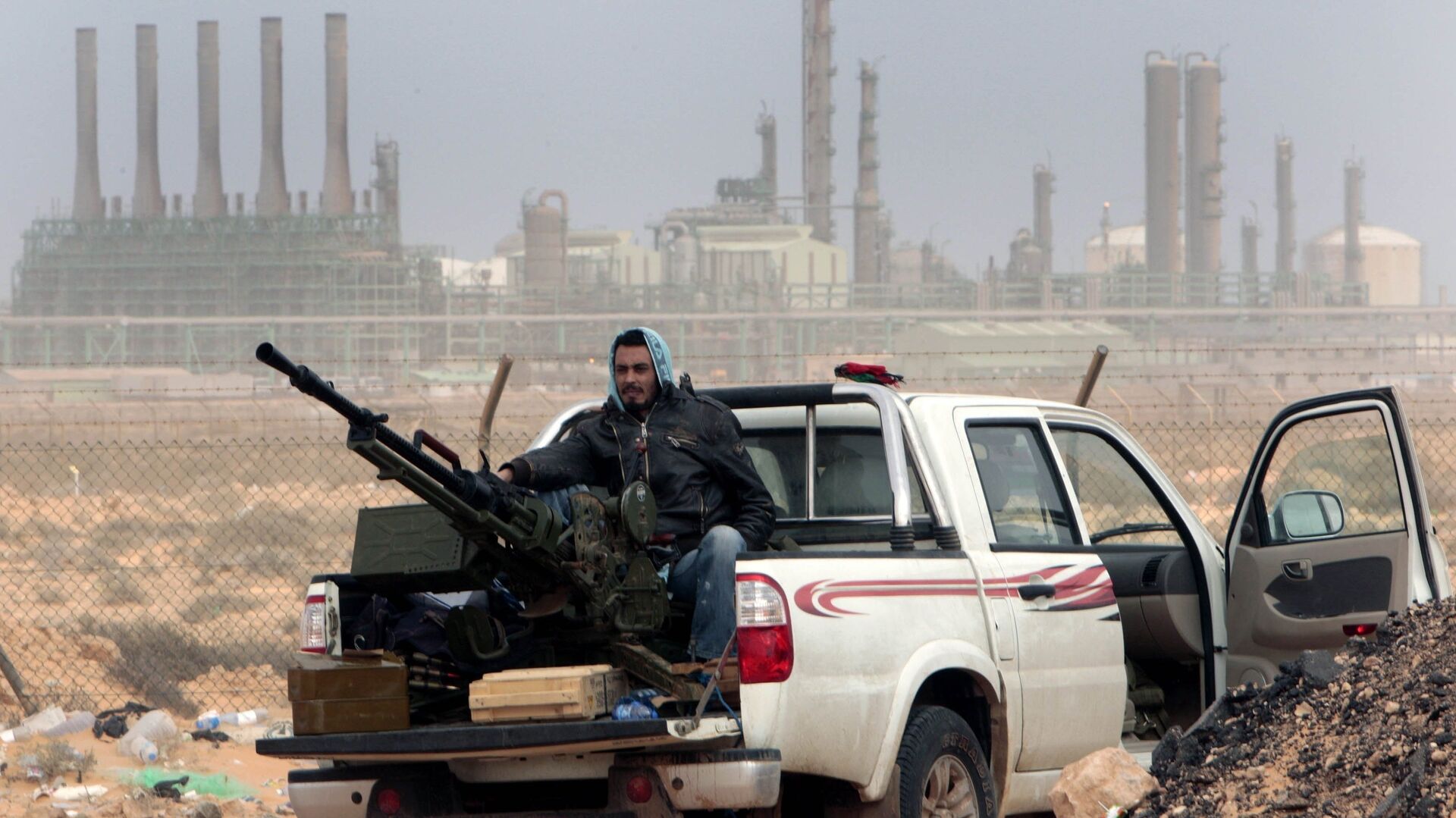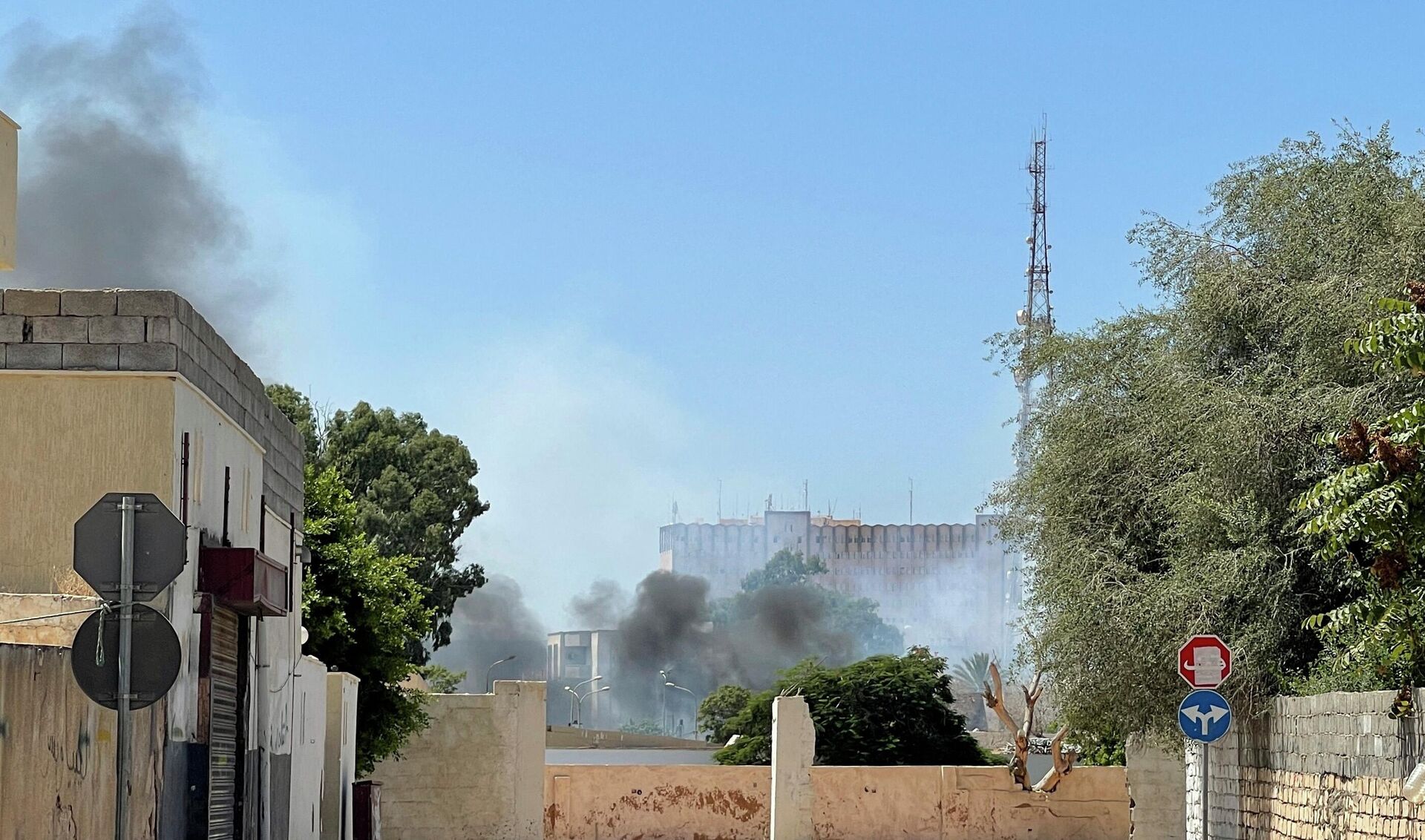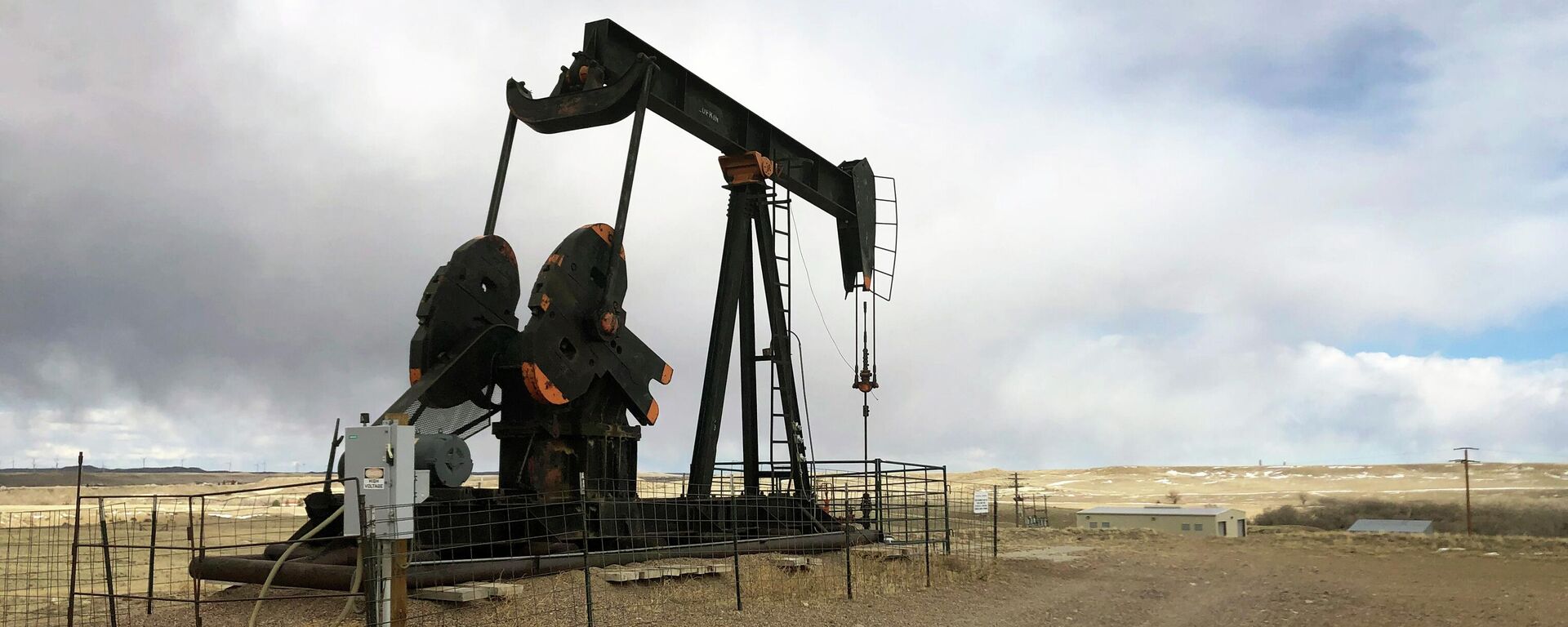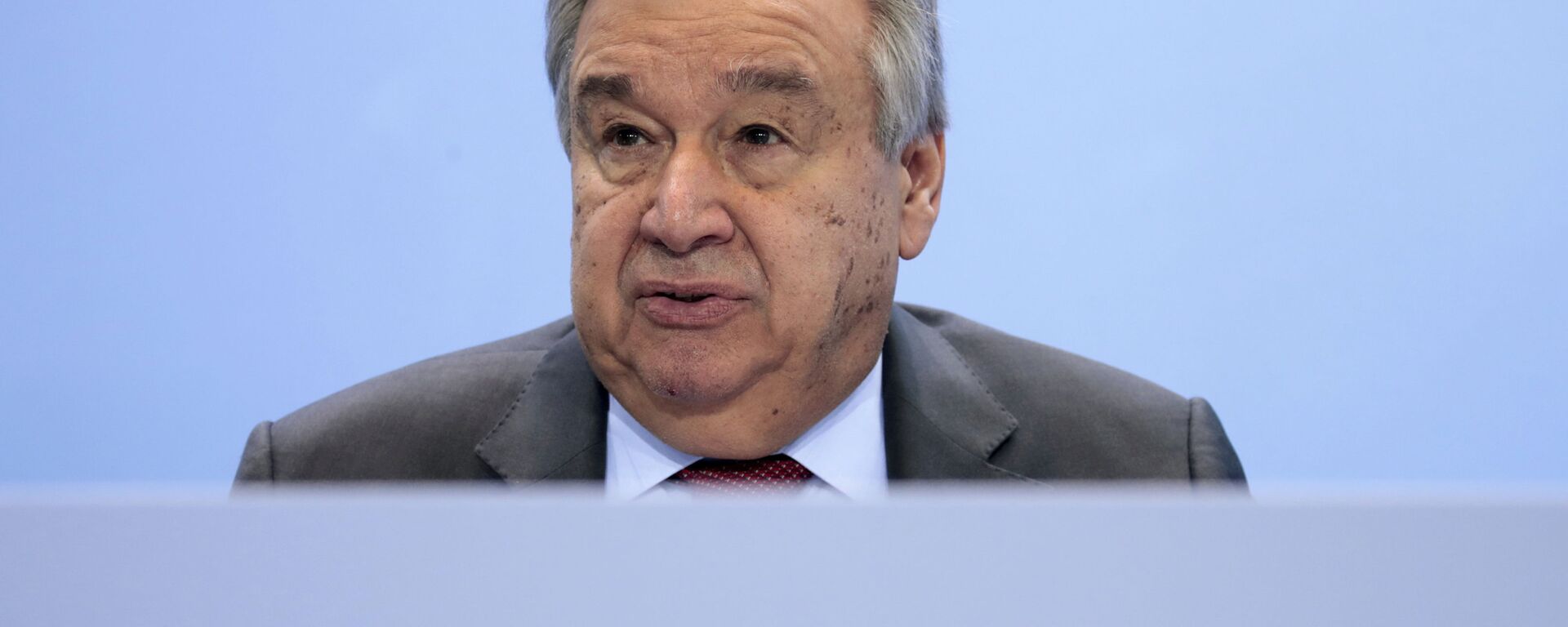https://sputnikglobe.com/20220828/how-dbeibeh-and-bashaghas-rivalry-risks-regressing-libya-to-civil-war-era-1100092673.html
How Dbeibeh and Bashagha's Rivalry Risks Regressing Libya to Civil War Era
How Dbeibeh and Bashagha's Rivalry Risks Regressing Libya to Civil War Era
Sputnik International
Around 32 people have died and another 159 have been injured in the Libyan capital Tripoli amid protests which erupted on August 26 between the supporters of... 28.08.2022, Sputnik International
2022-08-28T16:00+0000
2022-08-28T16:00+0000
2022-11-24T11:04+0000
us
russia
france
italy
muammar gaddafi
saif al-islam gaddafi
elections
protests
civil war
nato
https://cdn1.img.sputnikglobe.com/img/107404/89/1074048903_0:186:3154:1960_1920x0_80_0_0_d6468536b0b9d8e4c58e1b23d48b473e.jpg
Earlier this week Libya’s Prime Minister-designate Fathi Bashagha called upon his rival Abdul Hamid Dbeibeh to peacefully cede power amid rising military tensions in Tripoli. According to Bashagha, his opponent should "comply with the decisions of the legislative authority of the Libyan state, which is the same authority that gave [him] the vote of confidence."On February 10, the Tobruk-based House of Representatives elected Fathi Bashagha, who previously served as the interior minister of the Government of National Accord (GNA), to replace Dbeibeh. On March 1, Libyan lawmakers voted for a new cabinet headed by the prime minister-designate.However, when Bashagha arrived in Tripoli in May to assume office, he was forced to back down after violent clashes erupted between armed groups supporting him and those backing Dbeibeh. The prime minister-designate proceeded to base his government in Sirte, denouncing Dbeibeh’s government as “illegitimate” and vowing to return to the capital.Dbeibeh Sticking to PowerDbeibeh came to power following a landmark 2020 ceasefire between the UN-recognized Tripoli government and the rival one led by Libyan National Army (LNA) Commander Khalifa Haftar.Dbeibeh was appointed prime minister of the Government of National Unity on February 15, 2021, through the Libyan Political Dialogue Forum. Mohammad Younes Menfi was elected interim president. It was expected that Dbeibah would step down after the presidential elections scheduled for December 24, 2021.However, a few days prior to the long-anticipated poll, the head of Libya’s High National Electoral Commission (HNEC), Imad al-Sayeh, ordered the dissolution of the electoral committee and the postponing of the presidential election. The abrupt decision had been preceded by controversies pertaining to voting timetables, the eligibility of the main candidates, and the new powers of the next Libyan president and parliament.No official candidate list was presented to the public before the vote. It was reported, however, that 98 people registered to participate, allegedly including Haftar, Bashagha, Aqil Saleh, the chairman of the Libyan House of Representatives, and Saif al-Islam Gaddafi, the son of the former Libyan leader Muammar Gaddafi.After the vote was postponed, Dbeibeh announced that he would not resign until new presidential elections were held, arguing that his dismissal would lead to "division and chaos." The UN backed his decision and continued to support him even after the Libyan parliament unanimously elected Bashagha.Growing Divisions: Protests, Oil Blockade and Violent ClashesIt promptly became clear that the country had ended up in the same interregnum situation it tried to recover from in 2021.The rivalry between Bashagha and Dbeibeh and the plummeting living standards triggered mass protests across the country between their respective supporters. The protesters demanded the swift holding of presidential elections, and expressed frustration with the country’s electricity crisis and fuel shortage.Meanwhile, Bashagha's allies in the east organized attacks on Libyan oil facilities. Six oil fields and terminals were closed in mid-April by groups allegedly affiliated with the eastern camp. Apparently, they sought to curb the flow of the National Oil Corporation’s petrodollars to the Central Bank of Libya, which is controlled by the Bashagha's rival in Tripoli. The blockade coincided with the spike in oil and gas prices prompted by the EU’s "green" transition and largely exacerbated by the West's anti-Russia energy embargo.The UN stepped in, trying to broker an agreement between the rival camps on holding a presidential election to end the strife. However, a UN high-level meeting on Libya's constitutional track in Geneva failed to reach a deal in June, with participants disagreeing on the eligibility requirements for candidates.As the UN and it’s special adviser, Stephanie Williams, failed to mediate peace between the warring parties, demonstrations continued across Libya, including in Tripoli, Benghazi, Al-Bayda and Tobruk. In early July, the Parliament building in Tobruk was stormed and damaged. Armed clashes took place in Tripoli on July 21 and in Misrata on July 23.The standoff continued to escalate in August with 32 people being killed and 159 wounded in clashes this weekend. The United Nations Support Mission in Libya (UNSMIL) condemned the ongoing violence in the capital Tripoli on Saturday.Meanwhile, the head of the High National Elections Commission (HNEC), Emad al-Sayeh announced the end of force majeure on August 27 which had placed the December 2021 presidential election on pause. According to al-Sayeh, the only way out of the current crisis is "elections."Libya's Failed StatehoodLibya has been suffering from a perpetual governmental crisis and bloodshed since a US-backed NATO invasion of the country in 2011. The western intervention paved the way for the toppling and killing of longtime Libyan leader Muammar Gaddafi. The Libyan civil war opened the door to the huge influx of African asylum seekers into Europe. For over a decade, the country has been split between rival administrations in the east and west, with various external players throwing their weight behind Libya's warring parties.In 2018, a political standoff erupted between Italy and France which supported Fayez Mustafa al-Sarraj, then-head of the Government of National Accord (GNA) and his rival, Libyan military leader Khalifa Haftar, respectively. In January 2020, Ankara sent troops to Tripoli under a November 2019 security agreement with the Government of National Accord (GNA) to withstand Haftar's offensive. In addition, the UAE and Egypt have reportedly been backing Libya's eastern camp.At the same time, UN missions have failed to broker a lasting peace between clashing forces in the country for more than a decade.According to Andrey Chuprygin, senior lecturer at the Faculty of World Economy and Politics of Russia’s National Research University, the concept picked by the international community has failed as it does not create a solid political foundation for the country's revival.Western players appear to be more focused on maintaining control over Libya's oil and gas rather than on a state-building mission, according to the scholar.Dmitry Polyansky, Russia’s first deputy permanent representative to the UN, highlighted in June that Moscow believes that its "western colleagues, in the spirit of neo-colonial thinking, would like to impose on Libyans their vision of what the future structure of the country should look like and who should govern it."The upcoming presidential elections will be an important milestone on the way to restoring Libya's unity and statehood. In December 2021, Russian Foreign Minister Sergey Lavrov emphasized the necessity of allowing all responsible political forces to participate in the Libyan elections, adding that it's important that the outcome of the vote is recognized by all major domestic players.
https://sputnikglobe.com/20220418/oil-prices-rally-4th-day-in-row-as-libya-disruptions-add-to-russia-supply-squeeze-1094872510.html
https://sputnikglobe.com/20220828/death-toll-from-tripoli-clashes-reaches-32-number-of-injured-at-159-1100089013.html
https://sputnikglobe.com/20220703/un-secretary-general-warns-against-destabilization-in-libya-1096901878.html
russia
france
italy
africa
libya
Sputnik International
feedback@sputniknews.com
+74956456601
MIA „Rossiya Segodnya“
2022
News
en_EN
Sputnik International
feedback@sputniknews.com
+74956456601
MIA „Rossiya Segodnya“
Sputnik International
feedback@sputniknews.com
+74956456601
MIA „Rossiya Segodnya“
us, russia, france, italy, muammar gaddafi, saif al-islam gaddafi, elections, protests, civil war, nato, invasion, sputnik explains, libya
us, russia, france, italy, muammar gaddafi, saif al-islam gaddafi, elections, protests, civil war, nato, invasion, sputnik explains, libya
How Dbeibeh and Bashagha's Rivalry Risks Regressing Libya to Civil War Era
16:00 GMT 28.08.2022 (Updated: 11:04 GMT 24.11.2022) Around 32 people have died and another 159 have been injured in the Libyan capital Tripoli amid protests which erupted on August 26 between the supporters of the head of the Government of National Unity Abdul Hamid Dbeibeh and Prime Minister-designate Fathi Bashagha.
Earlier this week Libya’s Prime Minister-designate Fathi Bashagha called upon his rival Abdul Hamid Dbeibeh to peacefully cede power amid rising military tensions in Tripoli. According to Bashagha, his opponent should "comply with the decisions of the legislative authority of the Libyan state, which is the same authority that gave [him] the vote of confidence."
On February 10, the Tobruk-based House of Representatives elected Fathi Bashagha, who previously served as the interior minister of the Government of National Accord (GNA), to replace Dbeibeh. On March 1, Libyan lawmakers voted for a new cabinet headed by the prime minister-designate.
However, when Bashagha arrived in Tripoli in May to assume office, he was forced to back down after violent clashes erupted between armed groups supporting him and those backing Dbeibeh. The prime minister-designate proceeded to base his government in Sirte, denouncing Dbeibeh’s government as “illegitimate” and vowing to return to the capital.
Dbeibeh Sticking to Power
Dbeibeh came to power following a landmark 2020 ceasefire between the UN-recognized Tripoli government and the rival one led by Libyan National Army (LNA) Commander Khalifa Haftar.
Dbeibeh was appointed prime minister of the Government of National Unity on February 15, 2021, through the Libyan Political Dialogue Forum. Mohammad Younes Menfi was elected interim president. It was expected that Dbeibah would step down after the presidential elections scheduled for December 24, 2021.
However, a few days prior to the long-anticipated poll, the head of Libya’s High National Electoral Commission (HNEC), Imad al-Sayeh, ordered the dissolution of the electoral committee and the postponing of the presidential election. The abrupt decision had been preceded by controversies pertaining to voting timetables, the eligibility of the main candidates, and the new powers of the next Libyan president and parliament.
No official candidate list was presented to the public before the vote. It was reported, however, that 98 people registered to participate, allegedly including Haftar, Bashagha, Aqil Saleh, the chairman of the Libyan House of Representatives, and Saif al-Islam Gaddafi, the son of the former Libyan leader Muammar Gaddafi.
After the vote was postponed, Dbeibeh announced that he would not resign until new presidential elections were held, arguing that his dismissal would lead to "division and chaos." The UN backed his decision and continued to support him even after the Libyan parliament unanimously elected Bashagha.
Growing Divisions: Protests, Oil Blockade and Violent Clashes
It promptly became clear that the country had ended up in the same interregnum situation it tried to recover from in 2021.
The rivalry between Bashagha and Dbeibeh and the plummeting living standards triggered mass protests across the country between their respective supporters. The protesters demanded the swift holding of presidential elections, and expressed frustration with the country’s electricity crisis and fuel shortage.
Meanwhile, Bashagha's allies in the east organized attacks on Libyan oil facilities. Six oil fields and terminals were closed in mid-April by groups allegedly affiliated with the eastern camp. Apparently, they sought to curb the flow of the National Oil Corporation’s petrodollars to the Central Bank of Libya, which is controlled by the Bashagha's rival in Tripoli. The blockade coincided with the spike in oil and gas prices prompted by the EU’s "green" transition and largely exacerbated by the West's anti-Russia energy embargo.
The UN stepped in, trying to broker an agreement between the rival camps on holding a presidential election to end the strife. However, a UN high-level meeting on Libya's constitutional track in Geneva
failed to reach a deal in June, with participants disagreeing on the eligibility requirements for candidates.
As the UN and it’s special adviser, Stephanie Williams, failed to mediate peace between the warring parties, demonstrations continued across Libya, including in Tripoli, Benghazi, Al-Bayda and Tobruk. In early July, the Parliament building in Tobruk was stormed and damaged. Armed clashes took place in Tripoli on July 21 and in Misrata on July 23.
The standoff continued to escalate in August with 32 people being killed and 159 wounded in clashes this weekend. The United Nations Support Mission in Libya (UNSMIL) condemned the ongoing violence in the capital Tripoli on Saturday.
Meanwhile, the head of the High National Elections Commission (HNEC), Emad al-Sayeh announced the end of force majeure on August 27 which had placed the December 2021 presidential election on pause. According to al-Sayeh, the only way out of the current crisis is "elections."
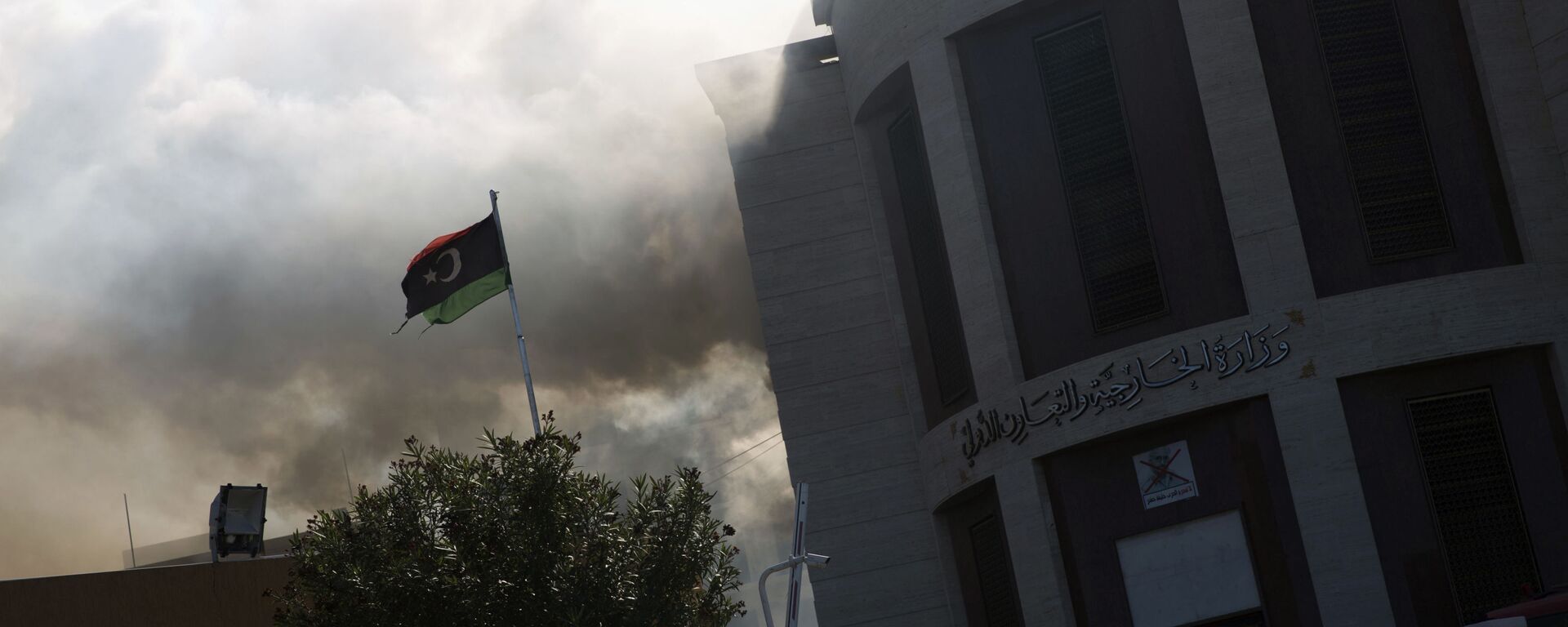
28 August 2022, 13:58 GMT
Libya has been suffering from a perpetual governmental crisis and bloodshed since a US-backed NATO invasion of the country in 2011. The western intervention paved the way for the toppling and killing of longtime Libyan leader Muammar Gaddafi. The Libyan civil war opened the door to the huge influx of African asylum seekers into Europe. For over a decade, the country has been split between rival administrations in the east and west, with various external players throwing their weight behind Libya's warring parties.
In 2018,
a political standoff erupted between Italy and France which supported Fayez Mustafa al-Sarraj, then-head of the Government of National Accord (GNA) and his rival, Libyan military leader Khalifa Haftar, respectively. In January 2020,
Ankara sent troops to Tripoli under a November 2019 security agreement with the Government of National Accord (GNA) to withstand Haftar's offensive. In addition, the UAE and Egypt have reportedly been backing Libya's eastern camp.
At the same time, UN missions have failed to broker a lasting peace between clashing forces in the country for more than a decade.
According to Andrey Chuprygin, senior lecturer at the Faculty of World Economy and Politics of Russia’s National Research University, the concept picked by the international community has failed as it does not create a solid political foundation for the country's revival.
"Libya has practically returned to the situation of 2014-2015 (…) The groups that have gathered under the umbrella of Dbeibeh and under the umbrella of Bashagah are dividing the same 'pie' called Libya, or rather the Libyan hydrocarbon resource," the expert believes.
Western players appear to be more focused on maintaining control over Libya's oil and gas rather than on a state-building mission, according to the scholar.
Dmitry Polyansky, Russia’s first deputy permanent representative to the UN,
highlighted in June that Moscow believes that its "western colleagues, in the spirit of neo-colonial thinking, would like to impose on Libyans their vision of what the future structure of the country should look like and who should govern it."
The upcoming presidential elections will be an important milestone on the way to restoring Libya's unity and statehood. In December 2021, Russian Foreign Minister Sergey Lavrov
emphasized the necessity of allowing all responsible political forces to participate in the Libyan elections, adding that it's important that the outcome of the vote is recognized by all major domestic players.
